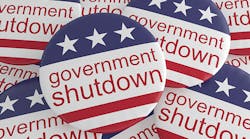Since December 21 the federal government has been in the grip of a partial shutdown in a budget battle over President Trump’s immigration policy. If you are a private sector employer without government contracts, you may be tempted to think that it doesn’t directly impact you, but you would be wrong.
A shutdown in the mid-1990s lasted for 21 days, and one that took place in October 2013 continued for 16 days. How long this one will last is anyone’s guess, especially with a new Democrat-dominated House of Representatives and the President’s adamant stand on building the border wall.
However, this time is a bit different from previous shutdowns, note attorneys for the law firm of Fisher Phillips. When Trump signed a September 2018 “minibus” funding bill, he fully funded a number of federal agencies through October 1, 2019. Because of that, the Department of Labor (DOL) and National Labor Relations Board (NLRB), among others, are fully staffed and operational during the duration of this shutdown.
As a result, it is expected that among the functions which will continue are wage and hour compliance matters (handled by DOL), and workplace safety matters handled by the Occupational Safety and Health Administration (OSHA), an agency of DOL, as well as federal contract compliance, handled by the Office of Federal Contract Compliance Programs, will still take place.
In addition, labor relations matters that come under the mandate of the NLRB—including union elections, unfair labor practice charges, litigation and similar events—will continue as usual, the Fisher Phillips attorneys point out.
However, because Department of Justice (DOJ) lawyers are furloughed during this shutdown, any litigation involving the federal government is impacted. On the first day of business after the shutdown began, DOJ lawyers requested that their civil cases be stayed and all deadlines postponed for the shutdown’s duration.
One federal agency that was not spared from the ravages of shutdown is the Equal Employment Opportunity Commission (EEOC). The minibus funding package signed into law last September did not include any funding for the civil rights agency.
According to its contingency plan released in November, its workforce of over 2,000 employees has been dramatically scaled back to only 103 staffers, some of whom would be working on a part-time basis. Because of this, the Fisher Phillips attorneys report that only a limited number of EEOC services are currently available.
There is a skeleton crew of 61 staff members working in field offices across the country ready to receive charges of discrimination, but they will almost certainly not have the time or resources to begin or continue any investigations.
In 2013, the EEOC received over 3,100 charges of discrimination during the 16-day shutdown, but no new investigations started and existing investigations stalled. The shutdown led to a backlog that took over a month for agency employees to work through after it ended.
Employers who have questions about pending or closed charges will be unable to receive information during this blackout period, the attorneys say. All mediations and hearings scheduled to take place during the shutdown have been cancelled, and any litigation directly involving the EEOC as a party is suspended unless the relevant court does not grant a requested continuance.
However, according to the EEOC website, individuals who believe they were subjected to discrimination in the workplace are being counseled to continue to file charges during the agency’s closure in order to ensure that statutes of limitation are not blown. The agency specifically says that time limits may not be extended because of the shutdown.
The Impact on Immigration
Employers might not feel as bad of a sting when it comes to immigration-related matters, and certainly not as badly as they did in 2013. The Department of Homeland Security (DHS) and its sub-agencies generally stay open during a shutdown. This includes U.S. Citizenship and Immigration Services (USCIS), which adjudicates the vast majority of immigration processes. Because USCIS is a fee-based agency which requires petitions and applications be accompanied by filing fee checks, these services are not expected to be impacted.
With respect to how this shutdown differs from 2013’s event, many other federal agencies are fully funded and will remain open this time around. Immigration officials interact with their counterparts at several other federal agencies in order to get their work done, and while these counterparts were not at work in 2013, many are this time around, the attorneys explain.
For example, during the 2013 shutdown, USCIS was not operating at full capacity because DOL stopped processing Labor Condition Applications, which are essential prerequisites for H-1B, H-2 and E-3 applications. DOL also ceased processing PERM/Labor Certification Applications, which are the first step in the majority of the permanent residence/green card process, and are the most common basis for immigrant visa processing and seasonal worker applications.
However, the State Department was not fully funded under September’s minibus bill and consulates and embassies are responsible for the issuance of visas which allow foreign nationals to travel into the U.S. Although this is a fee-based system, previous shutdowns saw delays and temporary stoppages of visa services because the State Department depends on other agencies for services such as calendaring appointments and background checks, the attorneys observe.
Employers will not be able to use E-Verify while the government is shut down. During this time, employers will not be able to access their E-Verify accounts to enroll, create an E-Verify case; view or take action on any case; add, delete or edit any user account; reset passwords; edit company information; terminate accounts; and run reports. In addition, employees will not be able to resolve E-Verify Tentative Nonconfirmations (TNCs) during this period.
To minimize the burden on both employers and employees, USCIS implemented the following:
• The “three-day rule” for creating E-Verify cases is suspended for cases affected by the unavailability of E-Verify.
• The time period during which employees may resolve TNCs will be extended. The number of days E-Verify is not available will not count toward the days the employee has to begin the process of resolving their TNCs.
• USCIS will provide additional guidance regarding “three-day rule” and time period to resolve TNCs deadlines once operations resume.
• Employers may not take adverse action against an employee because the E-Verify case is in an interim case status, including while the employee’s case is in an extended interim case status due to the unavailability of E-Verify.
• Federal contractors with the Federal Acquisition Regulation (FAR) E-Verify clause should contact their contracting officer to inquire about extending federal contractor deadlines.
Even if it is a mixed blessing for the federal government to rev up to full capacity when it comes to regulatory enforcement, we can hope the shutdown is short because that is a whole lot better than having to suffer through an extended period of uncertainty.



